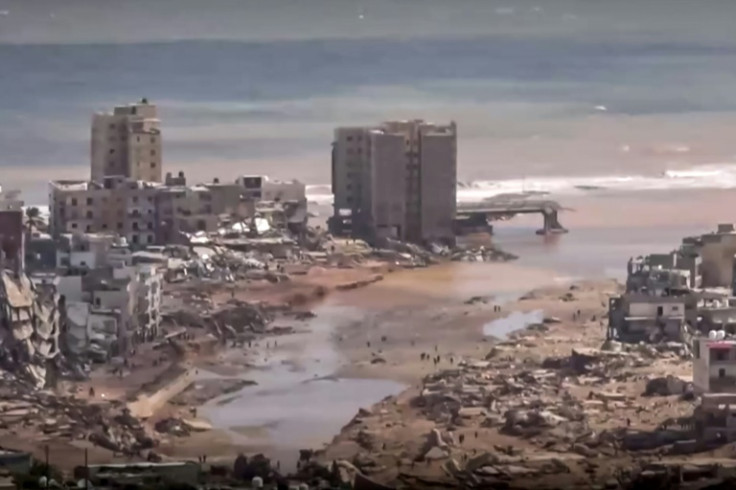
A global effort to assist stricken Libya gathered pace Thursday after a tsunami-like flood killed nearly 4,000 people and left thousands missing.
Military transport aircraft from Middle Eastern and European nations, along with ships, have been ferrying emergency aid to the North African country already scarred by war.
In addition to the missing, tens of thousands of people have been displaced after the huge flash flood slammed into the Mediterranean coastal city of Derna on Sunday. Witnesses compared it to a tsunami after two upstream dams burst when torrential rains brought by Storm Daniel battered the region.
The wall of water ripped away buildings, vehicles and the people inside them. Many were swept out into the sea, with bodies later washing up on beaches littered with debris and car wrecks.
It was the second major disaster to hit North Africa in days, after a 6.8-magnitude earthquake killed nearly 3,000 people last Friday in Morocco.
The United Nations has pledged $10 million to support Libya's survivors, including at least 30,000 people it said had been left homeless in Derna. That is almost a third of the eastern Libyan city's pre-disaster population.
Aid workers will face great challenges.
"Obstructed, destroyed and flooded roads severely undermine access to humanitarian actors," the International Organization for Migration said, adding there were widespread power outages and communications disruptions.
"The bridges over river Derna that connect the eastern part of the city to the west have collapsed," the IOM said.
Britain announced it was sending an "initial package" of aid worth up to GBP1 million ($1.25 million). London said it was working with "trusted partners on the ground" to identify the most urgent basic needs, including shelter, health care and sanitation.
Abdel Fattah al-Sisi, the president of Libya's neighbour Egypt, ordered "the establishment of shelter camps" for survivors of the Libyan disaster, according to state media.
France was sending around 40 rescuers and tonnes of health supplies along with a field hospital.
Turkey, one of the first to respond, announced Wednesday evening it was sending additional assistance by ship, including two field hospitals.
A naval vessel from Italy was also expected to be off Libya Thursday to provide logistical and medical support.
The European Union said assistance from Germany, Romania and Finland had been sent.
Algeria, Qatar and Tunisia have also pledged to help, while the United Arab Emirates sent two planes carrying 150 tonnes of aid. Another 40 tonnes of supplies took off Wednesday on a Kuwaiti flight.
Palestinian media reported a rescue mission had left from Ramallah in the occupied West Bank, and Jordan sent a military plane loaded with food parcels, tents, blankets and mattresses.
Oil-rich Libya is still recovering from the war and chaos that followed the NATO-backed uprising which toppled and killed longtime dictator Moamer Kadhafi in 2011.
The country has been left divided between two rival governments -- the UN-brokered, internationally recognised administration based in Tripoli, and a separate administration in the disaster-hit east.
The confirmed death toll reached 3,840 by Wednesday afternoon, said Lieutenant Tarek al-Kharraz, spokesman for the eastern-based government's interior ministry.
The figure includes 3,190 victims who have already been buried and at least 400 foreigners, mostly from Sudan and Egypt, Kharraz told AFP, adding 2,400 people were still missing.
Some media reports have quoted officials giving higher tolls.
Tamer Ramadan of the International Federation of Red Cross and Red Crescent Societies said earlier that the organisation had independent sources saying that "the number of missing people is hitting 10,000 persons so far".
Climate experts have linked Libya's disaster to a combination of the impacts of a heating planet and the country's years of political chaos and underinvestment in infrastructure.



